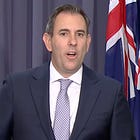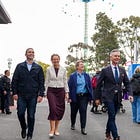Opposition Claims Government Missed Surplus Opportunity as Budget Debate Intensifies
Today’s Article is brought to you by Empower your podcasting vision with a suite of creative solutions at your fingertips.
This piece is freely available to read. Become a paid subscriber today and help keep Mencari News financially afloat so that we can continue to pay our writers for their insight and expertise.

The opposition accused the government of squandering a potential $12 billion surplus through spending decisions, escalating political tensions over the $10 billion deficit revealed in today’s final budget outcome.
Shadow Finance Minister James Patterson told ABC Afternoon Briefing the government could have delivered a third consecutive surplus if not for $22 billion in net spending decisions that drove the budget into deficit.
“This could have been a $12 billion surplus this year had they not proceeded with those $22 billion of net spending instead of being a $10 billion deficit,” Patterson said. “This is a Labor deficit. And we’ve now got a decade of Labor deficits to come and $1.2 trillion of debt at the end of the next term.”
The opposition’s critique centers on claims that Treasurer Jim Chalmers benefited from revenue windfalls rather than careful management, directly challenging the government’s narrative of fiscal responsibility.
Truth matters. Quality journalism costs.
Your subscription to Mencari directly funds the investigative reporting our democracy needs. For less than a coffee per week, you enable our journalists to uncover stories that powerful interests would rather keep hidden. There is no corporate influence involved. No compromises. Just honest journalism when we need it most.
Not ready to be paid subscribe, but appreciate the newsletter ? Grab us a beer or snag the exclusive ad spot at the top of next week's newsletter.
Government Defends Economic Record
Assistant Productivity Minister Andrew Lee defended the budget outcome, arguing stronger economic performance drove the improved position.
“The economy’s stronger and the budget’s stronger as a result. We’ve got wages growing, we’ve got more than a million jobs created, and we’re paying down Liberal debt,” Lee said. “We’ve turned those two big Liberal deficits into two Labor surpluses, and this deficit is now a fifth of what was projected it would be when we came to office.”
Lee emphasized the government returned 70% of additional tax receipts to the budget bottom line compared to 40% under its predecessors, highlighting what he called careful expenditure decisions.
Bracket Creep Debate
Patterson rejected government claims that economic growth explained improved revenue, attributing the gains primarily to bracket creep pushing workers into higher tax brackets.
“The primary reason why we’re getting higher income tax revenue is because of bracket creep. Australians’ wages have gone up due to inflation, but they’re not any better off because their cost of living has risen even faster,” Patterson said. “The secret behind Jim Chalmers’ surpluses has come off the backs of the hard work of Australians and their living standards, which have gone backwards on his watch.”
The shadow minister acknowledged company profits increased partly due to elevated commodity prices, particularly iron ore trading above Treasury’s conservative forecasts. “So Jim Chalmers and Katie Gallagher get to play this trick at every end of financial year and say, oh, well, the budget’s in a better position than we forecast it would be,” he said.
Lee countered that stronger income tax receipts reflected Australians doing better economically. “That’s not really a decision of government that’s led to that improved position, is it? It’s the strength of the economy,” interviewer Melissa Clarke noted.
“The Australians are doing better and the budget is doing better as a result, and that’s a great thing,” Lee responded, noting Australia reduced inflation without significant job losses unlike previous decades.
Tax Cut Strategy Questioned
When pressed on bracket creep, Patterson said the government’s planned tax cuts returning the lowest bracket from 16% to 15% to 14% gave back only a fraction of increased collections.
“They’re patting themselves on the back for giving Australians cents on the dollar back on the higher taxes they’ve paid,” he said. “If they’re really serious about bracket creep, they would do something like indexing income tax thresholds to inflation.”
Patterson declined to commit to specific tax reform proposals, citing the early stage of the parliamentary term. “At the back end of the term, we’ll absolutely be looking at tax reform that returns to Australians the hard money that they’ve worked hard for and earned,” he said.
PM’s UK Speech Controversy Continues
Both politicians addressed ongoing criticism of Prime Minister Anthony Albanese’s speech at the UK Labour Party conference, offering sharply different perspectives.
Patterson said he knew of no precedent for a prime minister addressing a foreign party political conference. “This side trip to a political conference is inappropriate. And, frankly, I think the Labor Party should be picking up the tab for that, not taxpayers, because it starts to look like this is a taxpayer-funded victory lap for a Prime Minister on a partisan basis,” he said.
The shadow minister dismissed comparisons to former Prime Minister Scott Morrison appearing with Donald Trump at an Ohio facility, noting Morrison did not address the Republican National Convention during Trump’s nomination.
“This was a joint event for an Australian company investing in the United States, and it was a way of building rapport with a Republican president,” Patterson said. “This is a political intervention in the UK politics, trying to bail out a mate.”
Lee defended Albanese’s speech as following historical precedent and serving national interests.
“It followed very much in the history of Clement Attlee and Ben Chifley’s relationship, the strong relationship between Tony Blair and Bob Hawke and Paul Keating,” Lee said. “The Prime Minister spoke about the importance of defending democracy at a time in which populism is on the rise.”
Lee emphasized Albanese met with Conservative leader Kemi Badenoch and her shadow cabinet, the King, and leaders of Canada, Spain and Iceland during the trip.
When Clarke suggested a future opposition prime minister could address the Republican National Congress under the same principle, Lee distinguished between parties of government and opposition movements. “This is a party of government, and I think that is important to recognise here. It’s the party that has the vast majority of the seats in the House of Commons,” he said.
Inflation Concerns and Reserve Bank
Both politicians addressed market expectations the Reserve Bank would hold interest rates steady at its meeting.
Patterson noted two recent monthly inflation prints came in higher than Reserve Bank forecasts. “It does appear that either there’s the last mile of sticky inflation, which is being very difficult to eradicate, or there may even be a tick-up in inflation,” he said.
He warned elevated household financial pain could continue if anticipated interest rate cuts failed to materialize, emphasizing the importance of prudent fiscal management from Canberra to reduce inflation pressure.
Lee said the government recognized households with recent mortgages faced pressure. “It’s those challenges that are leading us to be very careful with the government budget,” he said, noting the government delivered consecutive surpluses and the biggest budget turnaround of any parliamentary term.
“The government is working in tandem with the Reserve Bank in order to now have brought inflation into the Reserve Bank’s target band,” Lee said.
Smelter Bailout Principles
Patterson attributed struggles at energy-intensive industries seeking government support directly to increased energy costs under the Labor government.
“Labor has to take some responsibility here for the energy price disaster on their watch that has caused these previously profitable companies to become unviable or potentially unviable,” he said.
While calling the industries strategically important, Patterson said he would prefer reducing energy bills to taxpayer bailouts. “I think we have to look at what we can do to get them through these difficult periods, but then I’m much more interested in solving the holistic problems,” he said.
Patterson acknowledged energy market problems likely could not be solved quickly enough to avoid bailouts. “Unfortunately, I think it is going to be necessary to get these companies through that period with taxpayer assistance, although I think we should set a high bar as to who qualifies,” he said.
Lee said decisions on facilities like the Tomago smelter would ultimately fall to the industry minister. “We’ll be thinking about the national interest and how Australians can benefit from a clean energy transition and from maintaining that strong manufacturing base,” he said.
GST Distribution Review
Patterson criticized Chalmers for reviewing Western Australia’s GST arrangements after Labor ran campaigns claiming the Liberal Party had secret plans to change distribution formulas.
“I think he should be clear, is that on the table? Will he take away WA’s GST?” Patterson said. The opposition does not support changes to the arrangement guaranteeing states receive at least 70 cents per dollar of GST collected.
When Clarke suggested the WA top-up represented exactly the kind of spending program requiring scrutiny under fiscal discipline, Patterson defended the policy’s broader applicability. “It applies to any state that would fall below 70 cents in the dollar of GST,” he said.
Economic Performance Claims
Lee highlighted Australia’s achievement reducing inflation without significant employment losses as rare globally and unique in Australian history.
“Getting inflation under control involved a whole lot of people losing their jobs” in previous decades, Lee said. “That hasn’t happened this time and that’s reflected in the stronger income tax receipts as well as, of course, low unemployment figures.”
Lee emphasized government focus on productivity-boosting reforms including national competition policy and merger reforms. “We do need to be focused on productivity boosting reforms,” he said, referencing recommendations from last month’s economic reform roundtable.
Patterson maintained the government showed no discipline in restraining spending, contrasting Labor’s approach with the previous coalition government’s requirement that every dollar of new spending be offset by savings elsewhere. “Had they found the savings elsewhere, they could have delivered that cost of living relief and a budget surplus,” he said.
The competing narratives underscore fundamental disagreements over economic management as both parties position themselves ahead of future budget debates.
Sustaining Mencari Requires Your Support
Independent journalism costs money. Help us continue delivering in-depth investigations and unfiltered commentary on the world's real stories. Your financial contribution enables thorough investigative work and thoughtful analysis, all supported by a dedicated community committed to accuracy and transparency.
Subscribe today to unlock our full archive of investigative reporting and fearless analysis. Subscribing to independent media outlets represents more than just information consumption—it embodies a commitment to factual reporting.
As well as knowing you’re keeping Mencari (Australia) alive, you’ll also get:
Get breaking news AS IT HAPPENS - Gain instant access to our real-time coverage and analysis when major stories break, keeping you ahead of the curve
Unlock our COMPLETE content library - Enjoy unlimited access to every newsletter, podcast episode, and exclusive archive—all seamlessly available in your favorite podcast apps.
Join the conversation that matters - Be part of our vibrant community with full commenting privileges on all content, directly supporting The Evening Post (Australia)
Catch up on some of Mencari’s recent stories:
It only takes a minute to help us investigate fearlessly and expose lies and wrongdoing to hold power accountable. Thanks!








